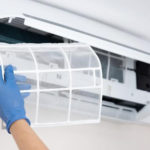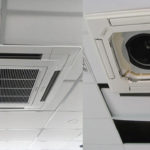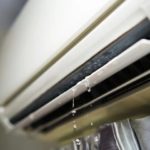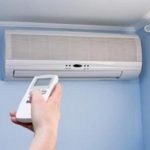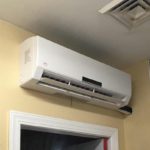Air Conditioner Maintenance Before Summer
Although it’s not officially summer yet, the capital of Hanoi is experiencing its first heat wave of the year. According to weather forecasts from electronic applications as well as the National Center for Hydro-Meteorological Forecasting, the highest temperature during the day can reach up to 35 degrees Celsius. The sun is scorching, accompanied by sultry weather.
Due to the hot and humid weather, many families have started using air conditioners. However, since they have been “hibernating” for a long time, air conditioners should be checked and cleaned before being used again.

The reason is that when not in use for a long period of time, lasting from 2-3 months, both the inside and outside of the device will inevitably accumulate dust and dirt. These contaminants can be carried outside by the cold air, affecting the air quality and living space of the family, as well as posing a potential health hazard, especially for those with respiratory problems.
Accumulated dust and dirt can also reduce the efficiency of the air conditioner, making it noisy and consuming more electricity. Therefore, according to the recommendations of experts, before using the air conditioner during this hot weather, users should thoroughly clean the device, especially important parts such as the blades, fan shaft, condenser, and filter.

How to Clean an Air Conditioner
Cleaning an air conditioner is a relatively simple task that users can do themselves at home. Or, for families with no experience, they can seek the help of professional technicians.
An air conditioner consists of two main parts: the indoor unit and the outdoor unit. Both of these parts need to be cleaned, disinfected, and inspected before being put into operation.
First, clean the indoor unit. Users need to remove the air conditioner’s filter, wash it with water, and gently scrub it with a brush. Finally, wait for it to dry and reinstall it. In addition to cooling, the filter also helps purify the air, reducing bacteria and dust from entering the space. When the air conditioner in general or the filter in particular is not cleaned, it will inadvertently become a “breeding ground” for bacteria, containing many allergens that affect the respiratory health of family members.
While waiting for the filter to dry, users can also use a soft, damp cloth to wipe the front of the air conditioner to clean it thoroughly.

Secondly, clean the outdoor unit of the air conditioner. If the family has a hose with strong water pressure, they can use it to spray water for cleaning. When cleaning, make sure to completely disconnect the power supply to the device. However, the best, most effective, and safest way is to seek the help of professional air conditioning repair and cleaning technicians.
Due to its operating characteristics, the outdoor unit of an air conditioner is usually installed outdoors, either suspended high or difficult to access, and professional technicians will have specialized tools to properly check and clean this part.

After cleaning the various parts of the air conditioner, the user can turn on the circuit breaker/plug it in and use it as normal.
In addition to air conditioners, ceiling fans also need to be washed and cleaned after the winter season. There are two methods that users can do themselves.
– Method 1: Turn off the power, remove the parts such as the fan cage and fan blades for separate cleaning, wait for them to dry, and then reassemble.
– Method 2: Spray a cleaning solution onto the fan blades. Let it soak for about 15 minutes and then turn on the fan to blow the dust and dirt away. However, this method still carries the potential risk of electrical shock and is not safe for the device.
Source: Đời Sống Pháp Luật
























